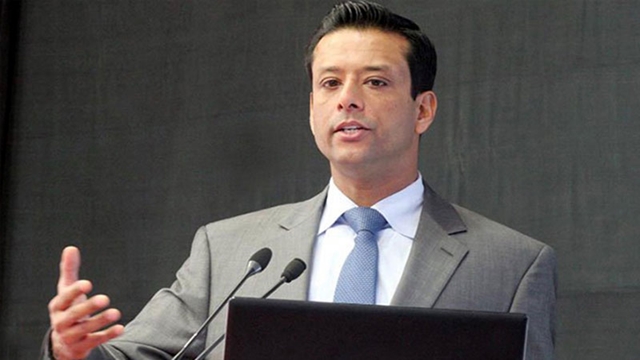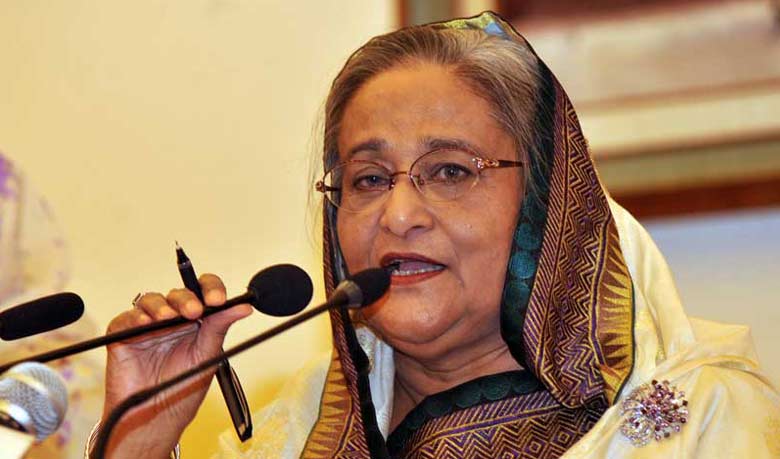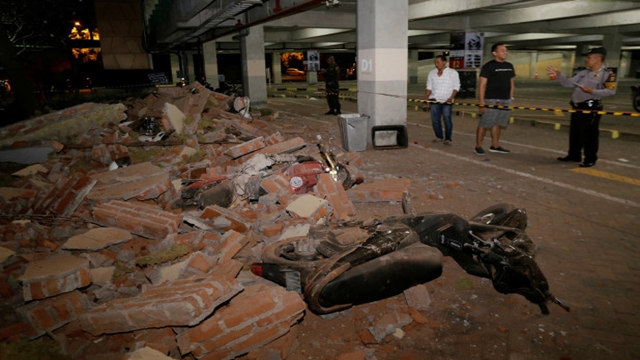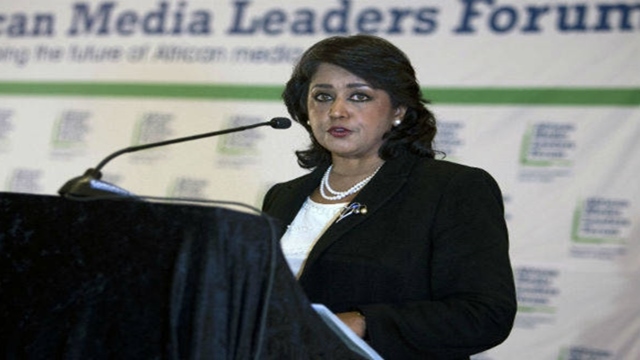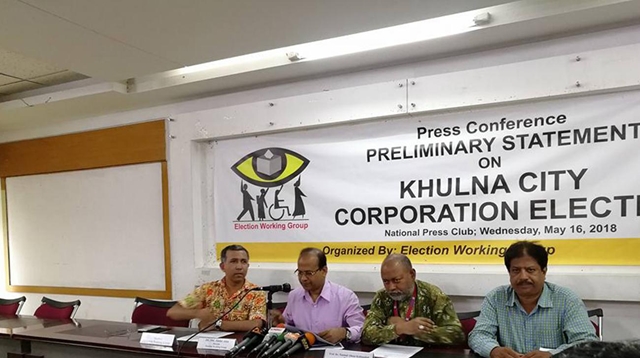A H Khan
Published:2019-01-13 23:27:46 BdST
AL’s vote margin disproves opposition’s “rigging” claim: Joy
Prime Minister’s ICT affairs adviser Sajeeb Wajed Joy has called “mathematically impossible” the opposition claims of vote rigging in view of the margin of votes that offered Awami League the landslide victory in the December 30 elections.
“The Awami League’s margin over the BNP is about 49 million votes. It is
simply not possible to manipulate elections by 49 million votes without it
being caught on everyone’s mobile camera,” Joy in a post on his facebook
today.
He added: “The fact is that it is mathematically impossible.”
Joy accused Jatiya Oikya Front (JOF) with BNP being its key partner of
lobbying with their “foreign masters” to prove rigging in the just concluded
national elections.
“The BNP and Oikya Front, having been thoroughly rejected by our voters,
have taken to begging their foreign masters for help. They are on an
international lobbying and PR blitz to try to prove that our elections were
rigged,” he said.
As for their claims of voter intimidation, Joy said, even if every voter
who did not vote for AL voted for the Oikyofront, “they would still be more
than 22 million votes short”.
The premier’s adviser simultaneously criticized “a section of our so called
‘civil society” for their continued support to BNP’s international PR
campaign against the election while refuting point-wise their allegations
saying, “I would like to address all their complaints and raise a few of my
own”.
The first complaint of theirs, he said, was that voter turnout was too
high and indicates false votes. The final voter turnout figure is 80 percent
and it is not a record in Bangladesh and that distinction is held by the 2008
elections under the 2007-2008 ‘caretaker’ regime when turnout was 87 percent,
he said, adding that the AL won that election in a landslide with 48 percent
of the vote by itself.
In 2001 the voter turnout was around 75.6 percent and in 1996 it was 75
percent. Turnout was just slightly higher in December 30 polls because this
is the first fully participatory election in a decade, he said.
The second propaganda, he said, is that the ruling party received 90
percent of the vote. This is a complete falsehood, he said, adding that the
AL by itself received around 72 percent.
“Our Mohajote allies received just under 5 percent. Even the 72 percent is
not a record for the AL. In the 1973 election after independence the AL
received 73.2 percent of the vote and just as the reason then was that the AL
led the country to Independence,” Joy said.
AL’s vote increase this time has two very good reasons. The first reason,
he said, is simply because AL government has improved the lives of the
citizens more than any other government in Bangladesh’s history.
“We have become a middle income country, per capita income has tripled,
poverty has been halved, almost everyone has access to education, basic
healthcare, electricity, and the list is endless. If there was a way to
improve the lives of the Bangladeshi people, our government has done it or
the progress is visible, he added.
About the role of civil society he said, ‘civil society’ keeps harping
about how the Bangladeshi voters are anti-incumbent, but that is just an
indication of how out of touch they are with the common man. If you are an
ordinary citizen, even if you are a wealthy businessman, your life and
business are doing so much better now since the AL has turned Bangladesh into
the fastest growing economy in the world, he said.
“Why would you vote against the government that has transformed your life
and business?,” he commented.
The second reason, he said, is that AL’s election campaign did not start
last year. It started right after the 2014 elections.
“We have not wasted any opportunity to inform the Bangladeshi people that
we, the Awami League, are solely responsible for the positive changes in
their lives. While the opposition and ‘civil society’ were busy complaining
about problems, we were telling people how we were providing solutions,” said
Joy.
He said one of the favorite refrains of the ‘civil society’ was that AL has
the largest number of new voters in this election, who do not care about
political parties and would be anti-incumbent.
“What they did not consider was that these young men and women grew up
with the visible development work of our AL government making their lives
better and easier every year. Why would they vote for anyone else?, he added.
Mentioning his experience about conducting opinion polls, Joy said he has
been conducting opinion polls for the Awami League since 2013. He has studied
polling at Harvard and have interviewed and tried several polling teams in
Bangladesh before he found the one he uses. Prior to the 2014 elections, he
said, civil society were busy publicizing one poll after another how badly
the Awami League was going to lose.
“The fact is very few people and organizations in Bangladesh know how to
conduct an accurate opinion poll,” he added.
“We don’t do artificial polls to inflate our popularity because that does
not give us the information we need. We poll to know what our popularity is
for elections and so our polls need to be accurate,”
Final opinion poll two weeks before the elections showed that the AL would
receive between 57 percent-63 percent of the vote and the BNP would receive
between 19 percent-25 percent. So how did the AL receive 72 percent of the
vote? The opinion poll sampled the entire voters list in 300 constituencies,
all 104 million voters. But there is never 100 percent voter turnout and
elections were held in 298 seats, not 300.
The number of registered voters in the 298 seats was 103.5 million and an
80 percent turnout means 82.8 million people voted. The AL received about 60
million votes. 60 million out of 103.5 million is 58 percent of registered
voters in those seats. The AL actually received votes on the low side of the
poll’s margin of error, he explained.
About BNP’s polls campaign, he said there was their self-defeating election
campaign, or rather a lack of it. The first thing they did was bring out
Tariq Rahman to pick election nominees, he said, adding that all this managed
to do is remind people of Hawa Bhaban and Tariq Rahman’s corruption and
violence. To add fuel to the fire, he picked known and wanted criminals and
war criminals as candidates, he added.
Next, the message they kept sending out to their supporters until the last
minute was that they would boycott the elections, he said, adding, “If you
think your party is going to boycott, are you going to go out to vote? This
is what caused the drop in their voter turnout and hence, their low
percentage of the vote.”
Finally, the only message the BNP and Oikyofront had for the people of
Bangladesh is that the AL is bad. Given that the people could see the visible
improvements in their lives over the past decade of the AL government this
was an extremely tough sell.
He said Oikyofront’s figurehead Kamal Hossain did not even run in this
election. It is because Kamal Hossain knew he had absolutely no chance of
winning a seat for himself, he added.
Of course, Oikyofront surprised all. For the very first time in their
existence as a political non-entity, his Gono Forum has actually won not one,
but two seats!
If there was any rigging in these elections, how could an opposition party
that has never won a single seat win two?, Joy added.
“The truth is far simpler. If you’re a citizen and especially a youth who
sees a dynamic leader such as Sheikh Hasina developing and transforming the
country, it won’t matter how much mud the opposition slings. At the end of
the day you are going to vote for the party that is improving your life and
the country,” Joy concluded.
Unauthorized use or reproduction of The Finance Today content for commercial purposes is strictly prohibited.


